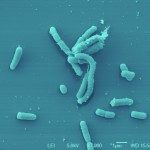Lien vers Pubmed [PMID] – 23178274
Lien DOI – 10.1684/ejd.2012.1878
Eur J Dermatol ; 22(6): 740-50
Chronic non-healing wounds form a medical need which will expand as the population ages and the obesity epidemic grows. Whilst the complex mechanisms underlying wound repair are not fully understood, remodelling of the actin cytoskeleton plays a critical role. Elevated expression of the actin cytoskeletal protein Flightless I (Flii) is known to impair wound outcomes. To determine if Flii is involved in the impaired healing observed in chronic wounds, its expression in non-healing human wounds from patients with venous leg ulcers was determined and compared to its expression in acute wounds and unwounded skin. Increased expression of Flii was observed in both chronic and acute wounds with wound fluid and plasma also containing secreted Flii protein. Inflammation is a key aspect of wound repair and fluorescence-activated cell sorting (FACS) analysis revealed Flii was located in neutrophils within the blood and that it co-localised with CD16+ neutrophils in chronic wounds. The function of secreted Flii was investigated as both chronic wound fluid and Flii have previously been shown to inhibit fibroblast proliferation. To determine if the inhibitory effect of wound fluid was due in part to the presence of Flii, wound fluids were depleted of Flii using Flii-specific neutralizing antibodies (FnAb). Flii depleted chronic wound fluid no longer inhibited fibroblast proliferation, suggesting that Flii may contribute to the inhibitory effect of chronic wound fluid on fibroblast function. Application of FnAbs to chronic wounds may therefore be a novel approach used to improve the local environment of non-healing wounds and potentially improve healing outcomes.


